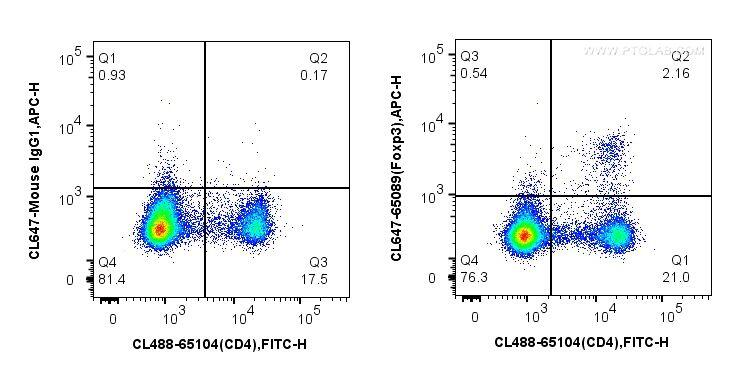CoraLite® Plus 488-conjugated CD40L/CD154 Monoclonal antibody
CD40L/CD154 Monoclonal Antibody for
Host / Isotype
Mouse / IgG2a
Reactivity
Human
Applications
Conjugate
CoraLite® Plus 488 Fluorescent Dye
CloneNo.
1E6D10
Cat no : CL488-66502
Synonyms
Validation Data Gallery
Product Information
CL488-66502 targets CD40L/CD154 in applications and shows reactivity with Human samples.
| Tested Reactivity | Human |
| Host / Isotype | Mouse / IgG2a |
| Class | Monoclonal |
| Type | Antibody |
| Immunogen | CD40L/CD154 fusion protein Ag24941 |
| Full Name | CD40 ligand |
| Calculated Molecular Weight | 261 aa, 29 kDa |
| Observed Molecular Weight | 32 kDa |
| GenBank Accession Number | BC071754 |
| Gene Symbol | CD40 Ligand |
| Gene ID (NCBI) | 959 |
| RRID | AB_2919336 |
| Conjugate | CoraLite® Plus 488 Fluorescent Dye |
| Excitation/Emission Maxima Wavelengths | 493 nm / 522 nm |
| Form | Liquid |
| Purification Method | Protein A purification |
| Storage Buffer | PBS with 50% Glycerol, 0.05% Proclin300, 0.5% BSA, pH 7.3. |
| Storage Conditions | Store at -20°C. Avoid exposure to light. Stable for one year after shipment. Aliquoting is unnecessary for -20oC storage. |
Background Information
The CD40 ligand (CD40L, TRAP, CD154), a member of the TNF superfamily of ligands, is expressed as either a 33-kd transmembrane homologue or 18-kd soluble form (sCD154). CD40L is primarily expressed on activated CD4+ T cells and on a small proportion of CD8+ T cells and platelets. It binds to CD40 on antigen-presenting cells (APC), which leads to many effects depending on the target cell type. It has been suggested that CD40/CD40L interactions regulate oxidative stress and affect various signaling pathways in both the immunological and the cardiovascular systems. The CD40/CD40L system is also involved in tumorigenesis. Its expression is tightly regulated, and abnormal levels of CD40L are associated with the pathogenesis of atheromatous plaque destabilization and thrombotic events. Multiple mutations in CD40LG gene have been identified that are associated with hyper-IgM immunodeficiency syndrome type 1.



